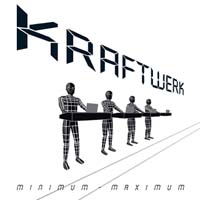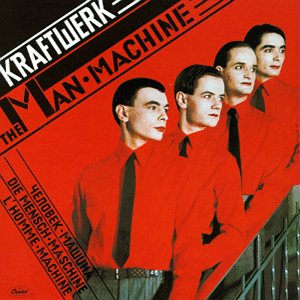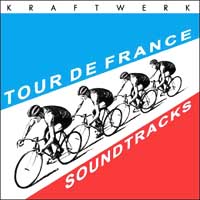Kraftwerk
Kraftwerk - Tour de France Soundtracks (2003)
Kraftwerk - Minimum-Maximum (2005)
Production: Analog production of digital sound with attention to detail.
Review: Elemental monotonous beats follow an equal counterpart in percussion rendered through keyboard melodic riff, and so forming a rhythmic foundation, provide basis for the defining trait of ambient music: layers of melody creating harmony on top of invariant timekeeping. Among these layers which provide structure, motivic change evolves through short but surprisingly profound melodies which pave way for dynamic change in listening experience.
While holding the basic beat to its extremity of the monolithic but deconstructing themselves into a space for interludes where a motivic shift can expand on melodic phrases to take them to conclusions, a mixture of the poignant and humorous with the technically apt, songs playfully rise to an apex before deconstructing into their formative elements and vanishing into repetition. Vocals are seemingly nerdy, un-ironic and without humor, presenting themselves plainly without affectation but an obvious appreciation for a human voice singing the right notes.
Fundamental ideas brachiate along a major theme, shadowed in lyrics with cryptic observations of the duality between meaning and physical presence, and then play with this absurdity underneath gentle beauty. Ideas that seem simple can be seen later as simply germinal, flowering into complexity that drops gracefully into a larger perspective when enough elements are introduced, like pulling back the camera of internal dialogue to show a landscape of infinite potential where a seemingly discrete, confined, sedate thing-in-itself previously existed. Through the use of classical structure in melody, epic topography and reliance on diatonic scales, Kraftwerk maintain a neoclassical feeling permeating the entire work.
Longer songs manage to retain their ironic simplicity as a mimickry of simple-mindedness, yet create melodic complexity within that form, and consequently never relapse into boredom or musical overindulgence. "Man-Machine" demonstrates an artistic way of growing aware and separating itself from the dangers it is trying to present, by paradoxically using its targets as base for its own musical success; an ironic take on the modern society and its different means of mechanizing the things that make us human.
Production: Straight from a laptop -- with a mixture of recognizably standard samples and highly modified ones -- with the utmost care to detail.
Review: After a nineteen year absence, Kraftwerk - the engineer/artists who shaped electronic music from educations in classical music theory and postwar German depression - have returned with an album that as always defies the first listen, leaving an enigmatic imprint and confusion as to its real motivation. Like any who explore modern or postmodern ideas, the music implies a narrative "from below" by not being overtly serious, yet introduces with sleight of hand the interconnections within its topics to create context, which it then probes with music that evolves in layers like classical over the pulsing beat of techno and rock, fusing the ancient and the modern into one narrative that emerges instead of being explicitly stated in these simple -- yet on second look, complex -- works.
"Tour De France Soundtracks" creates narrative as a soundtrack to a bicycle race in which the most basic elements of human struggle for supremacy over survival are developed, and like a meta-catharsis expressed in a daily but epic process, it shows us the voyeur-listeners the mental concentrations and sensations of that race. The album opens with a short prologue, a scene-setting like wide margins on an old book, but fresh and flickering on a digital screen. Lush electronic sounds overlap and form an ambiguous rhythm in minor transitions, like standing on the shifting sands of a seashore and staring into darkness as dawn rises; then, after a brief pause, one of the most triumphant melodies of human history arises as pure phrase, emphasizing its own rhythm and harmony in the context of its sentential self-recursion. It asks a question and immediately returns, a mantra like the universe itself interrogating an emptiness and formulating an ideal which then defines its starting point: a perfect loop.
Although many will reject "Tour De France Soundtracks" because its aesthetic is a "clubby" techno-influenced neo-industrial synthpop sound, what Kraftwerk are doing is taking the popular form and developing it internally toward greater heights. As they have always created in a hybrid of techno/industrial/ambient/synthpop, the aesthetic is easily adorned, and improved. These pieces follow the song format of successful techno hits, mimicking the structure of a techno "set," or mixed forty minutes of songs for dance purposes, with its ritualistic introduction, deepending and denouement. To the club techno sound, they bring a use of found noises -- heartbeats, bicycle chains, electric crackles, radio squelch -- and this in turn makes a more organic, enveloping feel to these sparse works. These songs are both solemn and joyfully reverent as they discover the beauty of life found through struggle -- in this case, of man and machine working together without elecricity.
In the ambiguous way that a sudden mood evoked by memory or the passionate objectless moments after awakening from dream can be, it launches us through a cavalcade of the simultaneously uplifting and serious, calling the lie to the idea that art can uplift without facing life head-on in transcendence of self. Layers mesh gently as songs reach apexes, then separate and allow the major themes to complete themselves in characteristically straightforward Kraftwerk melodies. The focus of the album is just enough fragmented to allow its conclusion, the articulate and determined La Forme, to slide up the spine of the listener with its elegant continuity, bursting into full form with a willful concluding motif that is heavy in the way of the best emotive metal bands, but like classical music, enwraps a collection of themes into a conclusion that does not linearize them, only returns them to a generative state in unformed conflict and hidden potential.

Tracklist
Disc 1
1. Die Mensch Maschine
2. Planet der Visionen
3. Tour de France étape 1
4. Chrono
5. Tour de France étape 2
6. Vitamin
7. Tour de France
8. Autobahn
9. Das Modell
10. Neonlicht
Disc 2
1. Radioactivität
2. Trans Europa Express
3. Abzug
4. Metall auf Metall
5. Nummern
6. Computerwelt
7. Heimcomputer
8. Taschenrechner
9. Dentaku
10. Die Roboter
11. Elektro Kardiogramm
12. Aérodynamik
13. Music Non Stop
Length: 2:01:14
Minimum-Maximum (Capitol, 2005)
After years of innumerable but rare live bootlegs, the inventors of modern electronic music bring us a 2-CD set which is part greatest hits and part a retrospective of the learning curve that digital instruments have brought to popular music for the past three decades. The brightest parts of it by far are the newest works, which sound most natural with the aesthetic and timeframe in which this live work is presented, but many of the older tracks fare well also, usually with minor updates but some with a large amount of changes, such as "Radioactivity." Where Kraftwerk maintain the mood of the original work, they do well, but where they try to make club hits out of songs which do not carry the aerobic insouciance of that genre, they fail. A case in point is "Pocket Calculator/Dentaku," which on this recording becomes an irritating worldpop intrusion of bounciness and vapidity. Probably the best reworking is "Aerodynamik" from their most recent studio album, which comes to us both stripped down and texturally enhanced live. While it may or may not be a perfect capture of the live essence of Kraftwerk, this album achieves what "The Mix" set out to do, years ago, and "updates" the Kraftwerk classics to be competitive to the aesthetic sensibilities of the post-techno years, and will serve for many as a very functional introduction to this foundational band from Dusseldorf.


